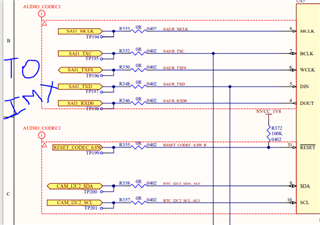Other Parts Discussed in Thread: TLV320AIC3104, , TAS2563
Hi team,
We are integrating two codecs with IMX8MM in android 11 code base.
As per the requirement, We have two audio codec in our design 1)TLV320AIC3104 and 2) TLV320AIC3100 .
Both the codecs are up and running individually. If I integrate wo codecs together, I'm getting output from only one TLV320AIC3104 audio codec.
As per the design, second codec which TLV320AIC3100 > 0.8W codec is going to use for only ALARM and notification.
Need your help implement above feature so that imx8mm can support both the codec at a same time. but second should work for only Alarm.
What are changes need to be done ?
Thanks
Divyesh.





